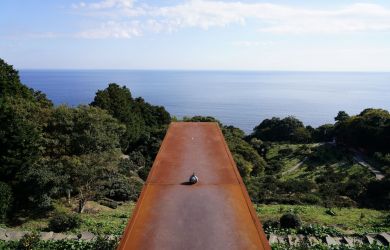
December 13, 2012
Bi ga Watashitachi no Ketsudan wo isshou Tsuyometa no darou
Intimate and admiring, if abstract, portrait of Adachi
By Metropolis
Originally published on metropolis.co.jp on December 2012

This documentary by French avant-garde filmmaker Philippe Grandrieux is an homage to radical Japanese auteur and Red Army member Masao Adachi, whose story is well-known in Japan though less so overseas.
In the 1960s Adachi collaborated with the enfant terrible of Japanese cinema Koji Wakamatsu on sex-laced “pink film” that scandalized Japan with its transgressive nature. As a Red Army member it was natural for him to then move to the Middle East to fight for the Palestinian cause while making films. He continued to do so until his politically motivated incarceration in Lebanon in 1997. Japan extradited him and he remained in prison in this country for two more years. After his release he documented his experiences and thoughts in the flick Yuheisha–Terorisuto (Prisoner/Terrorist; 2006), his first in over 30 years.
Adachi’s documentaries are always abstract and driven by concepts, and so it is with Grandrieux’s sketch of Adachi. The screen can be completely black as we hear the subject muse about life and his feelings. An intimate and admiring, if abstract, portrait of Adachi shines through.
English title: It May Be That Beauty Has Strengthened Our Resolve-Masao Adachi; 74 min







